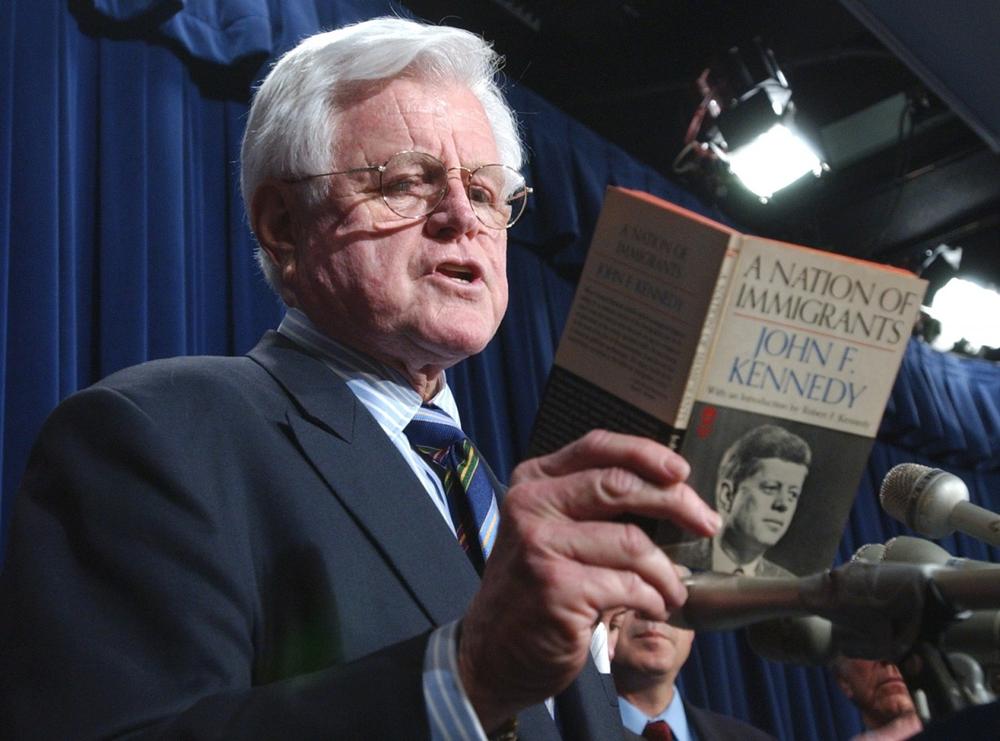Advertisement
Kennedy Shaped Modern-Day Immigration System
Resume
Sen. Edward Kennedy's first major legislative victory helped change the face of this country. In 1965, Kennedy sponsored the Immigration and Nationality Act, which lifted national quotas on immigrants entering the country. This victory also launched his political career advocating for the foreign-born.
Before 1965, it was nearly impossible for immigrants from anywhere besides Western Europe to come to the United States. Sen. Kennedy was in his early thirties and in office just a couple of years when he sponsored a bill that would change all that.
The legislation allowed "us to break away from the kind of discriminatory quotas that existed for decades," said Paul Watanabe, professor of political science at the University of Massachusetts Boston.
The law made family reunification the basis for immigration.
This ushered in a flood of immigrants from Latin America and Asia. The foreign-born population went from 10 million to nearly 30 million in 40 years. The system that Kennedy created has vexed people who favor strict restrictions on immigration.
"They created these immigration chains," said Mark Krikorian, from the Center for Immigration Studies, "where one person comes here and then brings his brother, who brings his wife and so on, creating the mass immigration that we have today."
Until the end of his life, Kennedy advocated louder than anyone else in the U.S. Senate to widen opportunities for the nation's immigrants. He crafted legislation raising the number of refugees coming to the U.S., and the 1986 bill that granted amnesty to 2.7 million people living here illegally.
Kennedy also helped individuals caught by immigration enforcement, people who weren't here legally.

Mario Rodas was detained in an immigration sweep in 2006. Kennedy wrote letters on his behalf to Immigration and Customs Enforcement. That delayed deportation long enough for Rodas to apply for and win political asylum to stay here.
Rodas, now 22, calls Kennedy his hero. "He didn't care what other people thought," Rodas said. "He always did what he thought was right. What he thought was moral. What he thought was human."
Kennedy came to New Bedford in 2007 to meet with the families of 361 immigrants detained in a factory raid. Afterward, he denounced the government for detaining parents with young children, and sending them to a Texas lock-up.
"They terrorized women, they terrorized children, they broke up families," Kennedy said, standing outside a Catholic Church in New Bedford where immigrant families were meeting. "I don't want to go back to the United States Senate and hear from administration officials about family values."
After the raid, Kennedy and Sen. John Kerry convinced ICE to write special guidelines for the treatment of immigrants with children.
Ali Noorani, from the National Immigration Forum, a coalition of reform advocates, was in Massachusetts at the time.
"The guidelines were the first time that immigration enforcement acknowledged that immigrants are human beings and should be treated as such," Noorani said.
According to Noorani, the series of large-scale raids in New Bedford and other parts of the country caused Kennedy to re-dedicate himself to immigration reform. Kennedy sponsored a bill with Sen. John McCain in 2007 that would have helped 12 million illegal immigrants get on a path to citizenship and strengthened workplace sanctions.
The bill failed. Reform advocates are gearing up for another try in 2010. They say it will be harder without Kennedy, but the senator laid the groundwork.
This program aired on August 27, 2009.